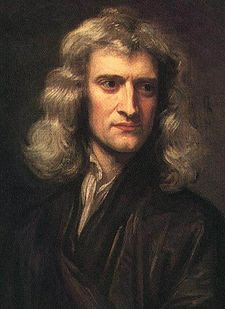
Sir Isaac Newton was born January 4, 1643 in England. He was a physicist, mathematician, astronomer, natural philosopher, alchemist, and theologian. Newton built the first practical reflecting telescope and developed the theory that a prism decomposes white light into many colors which form the visible spectrum or a rainbow. He developed an empirical law of cooling and studied the speed of sound. He developed the differential and integral calculus alongside Gottfried Leibniz. He demonstrated the generalized binomial theorem, developed the so-called "Newton's method" for approximating the zeroes of a function, and contributed to the study of power series.
He wrote the Philosophiæ Naturalis Principia Mathematica, published in 1687. In this book, Newton lays the groundwork for most of classical mechanics through developing the three laws of motion, his explanation of gravity, and he showed that the motions of objects on Earth and of celestial bodies are governed by the same set of natural laws by demonstrating the consistency between Kepler's laws of planetary motion. He removed the last doubts of heliocentrism.
Newton was very religious, and unorthodox. He produced more work on Biblical hermeneutics than the natural science he is remembered for today.
He is remembered today as the being the most influential scientist on the history of science through the 2005 survey of scientists in Britain's Royal Society.
He died March 31, 1727.

No comments:
Post a Comment